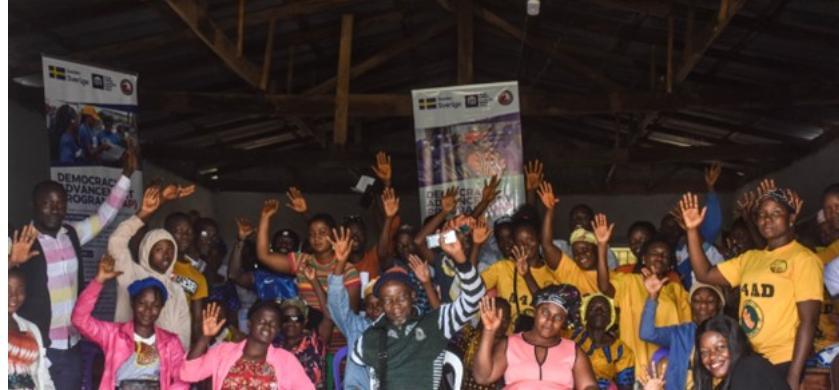Africa-Press – Liberia. Through its Democracy by Radio initiative aired on community stations, Naymote has educated citizens on the role of county councils, the authority of administrators, and the importance of local governance.
With support from the Embassy of Sweden, Naymote’s Democracy Advancement Program (DAP) is making significant strides in strengthening democratic governance, enhancing local service delivery, and increasing political accountability across Liberia.
The three-year initiative, funded by Sweden, aims to strengthen the social contract between citizens and their leaders by promoting transparency and public accountability. By generating and disseminating timely and credible information on government policies and citizens’ expectations, the program fosters inclusive development and civic engagement.
“The exploration or exploitation of Wologisi must holistically align with Lofa and Liberia’s overall development aspirations,” said veteran journalist Aaron Kollie, in response to Rep. Thomas Fallah’s push to grant a concession for Wologisi Mountain.
As part of a recent field visit, Naymote’s team—led by Program Director Peace Mahteh-Boyee—engaged with county service centers, civil society organizations, and local authorities in Grand Bassa, Bong, Nimba, and Lofa counties. The visit aimed to assess program implementation and collect feedback on its impact.
Leon Harris, outgoing Coordinator and current Budget Officer at the Bong County Service Center, praised Naymote’s role: “The support Naymote has provided over the years has greatly improved our capacity to deliver efficient public services. The operational capacity assessment report has helped us plan strategically and improve service delivery,” he said.
Through its Democracy by Radio initiative aired on community stations, Naymote has educated citizens on the role of county councils, the authority of administrators, and the importance of local governance. The program has empowered councils to independently review, approve, and monitor county development plans and budgets.
“Naymote has proven that with the right support, county councils can effectively implement development agendas,” said Beatrice L.S. Dokie, Chairperson of the Nimba County Council.
The organization also distributed over 500 FAQ brochures at County Service Centers, increasing public awareness of available services and helping to boost national revenue collection.
In Lofa and Nimba counties, Naymote organized town hall meetings to educate citizens about the AAID (AAREST Agenda for Inclusive Development), which includes 378 interventions, 52 programs, and 6 key pillars. Citizens welcomed the organization’s regular tracking and reporting of government commitments.
Francis Egu Lanssan, Lofa County Development Officer, emphasized the need for performance:
“We are not here for pleasure but to provide services. This is the president’s county, and we must deliver on the national development agenda,” he said.
At these forums, citizens voiced their desire for greater accountability and active participation in the development process. Tarnue N. Kerkulah, Lofa County Commander of the Liberia National Police, credited Naymote’s President Meter Project with inspiring transparency.
“We are constantly reminded of the promises we make to the people. It’s motivating us to do better,” he said.
The program also engaged youth through Governance Clubs in Bong County high schools. Students shared how Naymote’s work helped shape their understanding of democratic principles and responsible leadership.
“I used to abuse power as student leader, but Naymote’s teachings changed my perception entirely,” confessed Prosper Hance Nuquoi, a student and club member.
Built on the theory that political accountability enhances democracy and improves citizens’ lives, the DAP is already showing results—demonstrating that with the right support and civic engagement, meaningful change is possible in Liberia.
For More News And Analysis About Liberia Follow Africa-Press






